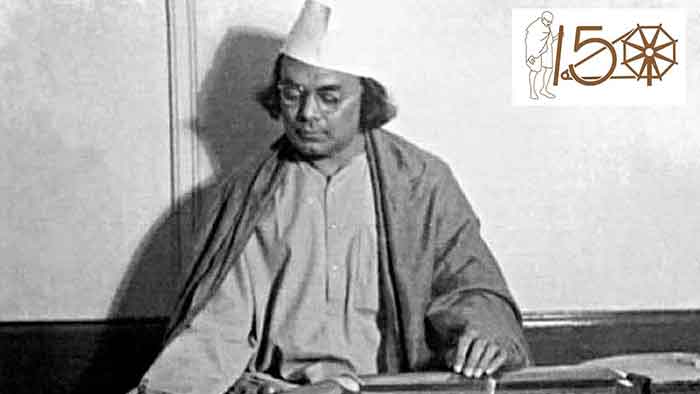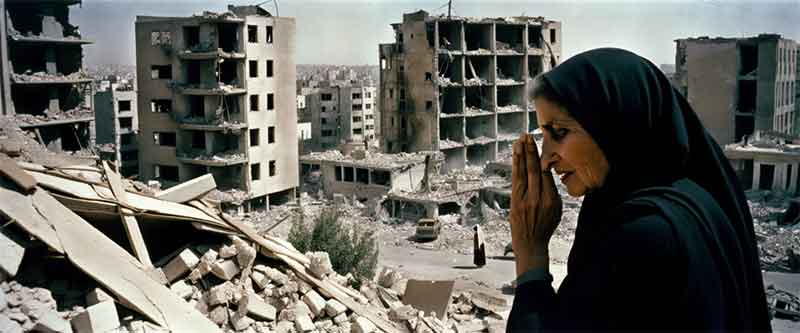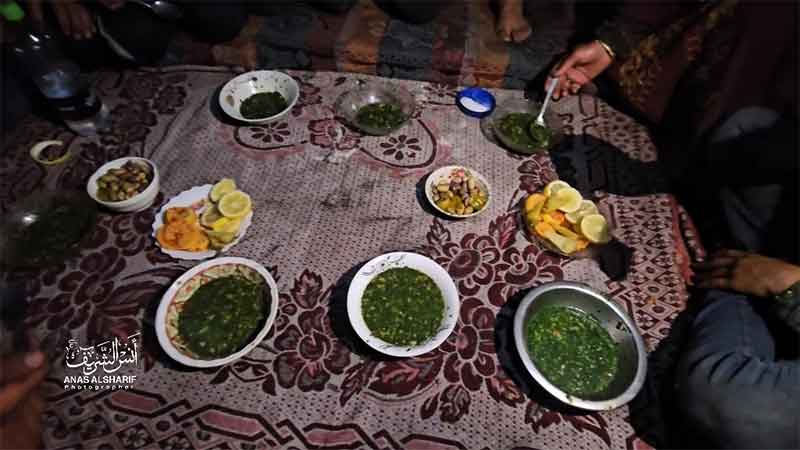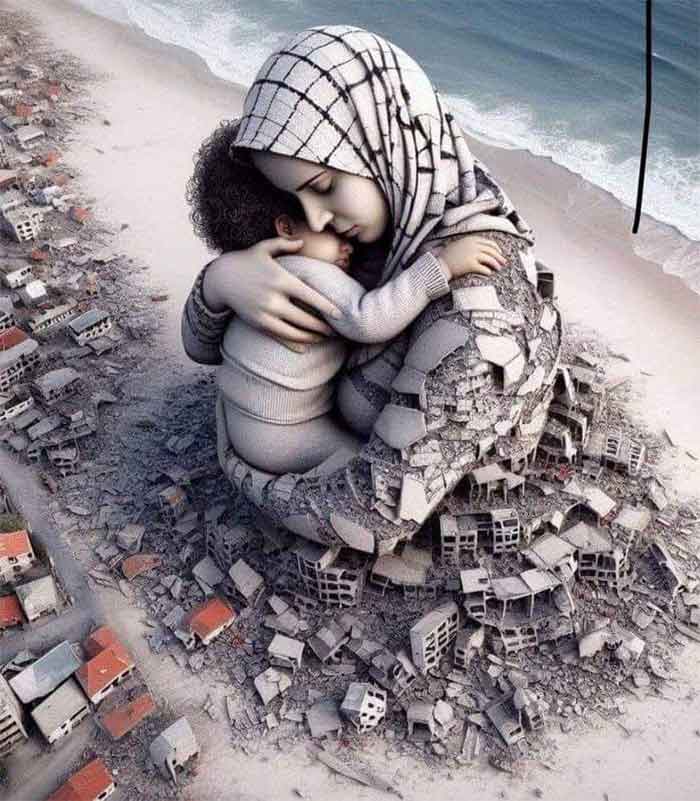Kandari Hoonshiar
by Kazi Nazrul Islam

Unscalable mounts, impassable deserts, turbulent seas
These you must conquer in freedom’s quest in the dead of night
Sailors, beware!
The surf rises in disquiet, the boat heaves, the boatman loses track
The sails have ripped, who will steer the course, who has the himmat?
Who here is young and brave, come forward, the future beckons
Must survive this tempest, must pass the stormy night
Must carry Freedom’s ship safely ashore.
The night is dark, all sentries pledged to the mantra of Mother’s honor-
Know that anguish accumulated from ages of subjugation bubbles up
Within tyrannized and oppressed hearts- fighters, we must bring them along
Win for them the rights and dignity they richly deserve.
Helpless denizens, know not how to swim, drown in the stormy sea
O Captain! I shall witness today the veracity of your Freedom’s pledge.
Are they Hindus? Are they Muslims? Who asks questions so asinine-
O Caption! Pray tell them ‘tis your brothers dying, children of your Mother!
Menacing mountain passes, tremulous trekkers, thunderclaps overhead
The ones bringing up the rear are filled with doubt and disbelief.
So Captain- will you lose sight of the goal, will you abandon Freedom’s ship?
Worry not if they brawl and squabble, you are pledged to this mission!
O Captain! Behold, before you is the battlefield of Palashy
Wherein, at the dawn of our subjugation, the blood of Bengalis
Dripped from the sword of the devious Clive! Captain, know for sure
This was the dawn when into the divine Ganga
The life-giving Sun of India sank – pledge, O fighters, that we shall
Usher in a new Sunrise, today, radiant in our collective blood.
Remember, brothers, all those who sang the Victory of Life, gladly offering
Their own on the gallows- they are now arrived at the threshold
Witnesses to your action- what measure of sacrifice would you make?
Brothers, it is your ultimate test- will you carry your Nation
Or your little clan to victory over the colonizing tyrants? Forget not
The surf rises in disquiet, the boat heaves, O Captain, Beware!!
Here is a relatively modern choral version (via YouTube) of this powerful song:
[Commentary: Of all the remarkable writers and stirring composers whose words and inspiring thoughts galvanized India’s (and specifically Bengal’s for the ones I readily think of) struggle to win victory over British colonialism between the mid-1800s and mid-1900s, the works of the “Rebel Poet” (Bidrohi Kabi) Kazi Nazrul Islam stand out entirely unmatched. Let me cite only one instance of how the sheer power of his words and the rhythmic melodies of these freedom songs stirred thousands across Bengal into instantly dedicating themselves to the cause of freedom- this one relative to my own father, who had in fact joined more than one underground movement during the heyday of Bengal’s revolutionary fervor (between the early 1900s until at least the 1940s) at a very young age, sacrificing personal advancement and spending five years in detention as a political prisoner. My father as a rule was not much into music (and he derided modern music rather vociferously), yet from the very earliest times, the Freedom Songs by Kazi Nazrul invariably managed to get him agitated and inspired – and my brother and I witnessed this in our growing years, even two decades after India had won a highly fractured freedom. And our own young minds were invariably transported to a plane of such high nobility and idealism- I must say, now in my own grey years, I still recall with the deepest fondness the impulses these songs created within my being- to try and do all I could to right a few wrongs in our world. In these pages, from time to time, I plan on highlighting some of Kazi Nazrul’s “Freedom Songs,” hoping that my channeling them into English will carry at least a small fraction of their power into the minds of readers. Kandari Hoonshiar is one such incomparable creation set to a martial tune. Cast under the allegory of a band of freedom-fighting foot-soldiers setting up for a critical voyage filled with uncertainties, it describes the seemingly insurmountable challenges faced by all activists fighting to end suffering and injustice (hence the repeated references to unscalable mountains and impassable deserts, and of course “Freedom’s ship” caught in a violent tempest (we are observing the same struggles continue across the world right now in our time)). As was very customary for Nazrul, a Muslim by birth, he draws upon the Mother image for India frequently (an image which was most powerfully inscribed by Bankim Chandra Chatterjee in Vande Mataram, the most powerful driving force, the mantra, behind India’s collective struggle), even though more readily identified with Hindu iconography. We note also how Nazrul poignantly recalls the battlefield of Palashy (the Bengali word which has been anglicized to the infamous Battle of Plassey (1757) in the Europeanized history books)- a battle which many regard as the starting point of the establishment of the English colonizing of the entire sub-continent. In this battle, the army of the reigning Nawab of Bengal (then undivided), Siraj-ud-Doula, suffered defeat at the hands of a lowly British military officer named Robert Clive (1725-1774, who thereafter acquired great wealth and renown, and rose to the rank of Major-General) – primarily, as often happens, via the treason of one of Siraj’s close associates and confidantes, Mir Zafar (such that from then on, within Indian folklore, the name Mir Zafar as acquired the same status as a Quisling). We note especially also Nazrul’s use of India’s Sun sinking permanently into the Ganges that day (an imagery powerfully used by Bankim Chandra Chatterjee much earlier at the dawn of India’s anti-colonial movement). Nazrul’s unmatched genius was also to incorporate Arabic/Persian words into his Bengali writing, which added more exotic power to the overall impact. In this, Kazi Nazrul remains virtually without a peer. In Kandari Hoonshiar alone, he uses himmat (a word in common usage would approximately mean courage and daring), jawan (not a common Bengali word; means young and virulent; also, a soldier), toofan (implying a storm or tempest), khoon (meaning blood), even hoonshiar (implying beware or be alert)- among several others. More of Kazi Nazrul’s Freedom Songs will follow, including the absolutely incomparable song he wrote in commemoration of The Internationale anthem and movement. MRC. June 2020]
Translation © Monish R Chatterjee 2020
SIGN UP FOR COUNTERCURRENTS DAILY NEWSLETTER
















































